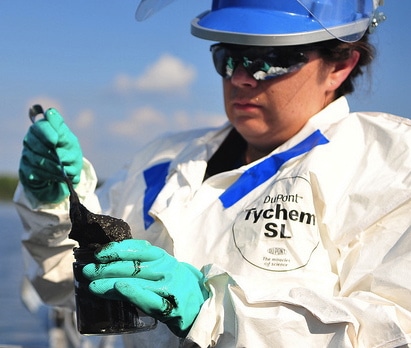U.S officials are struggling to figure out how bitumen from the Alberta oilsands will behave if there is a spill either from a pipeline or into the Salish Sea, the fragile ocean environment between Canada and the U.S.
As the U.S. debates the future of the TransCanada Keystone XL pipeline, which would transport Alberta oil to the Gulf Coast, and Canada looks at Kinder Morgan’s proposed twinning of the Trans Mountain pipeline and the proposed Enbridge Northern Gateway project, there is a growing urgency to find out how diluted bitumen behaves if there is a spill, said scientists, policy makers and environmentalists gathered in Seattle for the Salish Sea Ecosystem Conference this week.
“Does it float or not float? That’s the question,” said Gary Shigenaka, marine biologist with the U.S. National Oceanic and Atmospheric Administration (NOAA) hazardous materials response division, flashing a picture of thick, black bitumen extracted from the oilsands.
NOAA is studying the behaviour of bitumen and the diluent with which it is mixed to make the peanut-butter like substance flow through pipelines, but, so far, there are few concrete answers, Shigenaka said.
Studies show that although diluted bitumen — dilbit — initially floats in water, it sinks when it is mixed with sediment, which would happen in high turbulence or in areas such as a river estuary, Shigenaka said.
Fears about the behaviour of bitumen in water have been growing since the 2010 spill of about 3.2 million litres (843,000 gallons) of thick crude into a tributary of the Kalamazoo River in Michigan. It was the first spill of diluted bitumen from Alberta into a waterway, and agencies struggled to cope with a substance that released toxic fumes from the diluent and then sank as the bitumen mixed with river sediment.
Conventional cleanup equipment proved useless and, four years later, the cleanup continues.
“We are not very good about finding or recovering oil we can’t see,” Shigenaka said.
Additional problems with bitumen are the difficulty of rehabilitating oiled animals and little legislation regulating what goes into diluents, he said.
“That’s a big hurdle for us.”
More legislation is needed to control what is contained in diluents, speakers said.
“And we need to advocate for legislation that defines diluted bitumen as an oil, subject to oil spill regulations and crude oil taxes,” said Stephanie Buffum, executive director of Friends of the San Juans.
In the U.S. Pacific Northwest, the debate is centred more on expansion of coal terminals around Puget Sound and the emerging question of transporting oil by rail, especially oil from the Bakken shale oil fields in North Dakota, which is believed to be highly flammable, said Eric de Place, policy director for the Sightline Institute, a Seattle-based think tank.
But pipelines carrying dilbit are a vital issue, he said.
“There’s a pipeline boom,” ee Place said.
“Enbridge Northern Gateway and Kinder Morgan in the south would add dramatically more oil to coastal markets than Keystone XL, but the American audience knows little about it.”
The good news may be the history of environmental action in B.C., Washington and Oregon, de Place said.
“I think there’s a good chance we could be the place that can say no to tar sands expansion,” he said.
“In some ways it could be the most important global contribution this region can make.”
Photo: Water and sediment sampling operations during the Environmental Protection Agency’s Enbridge spill response near Battle Creek, Michigan. Photo courtesy of U.S. Coast Guard Petty Officer Second Class Lauren Jorgensen via Flickr.
Subscribe to our newsletter
Stay up to date with DeSmog news and alerts






